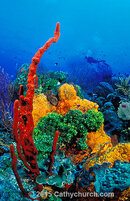
Have you ever wondered how people find these huge red finger sponges on the same dive where you saw only little ones? The answer is that these ARE the little ones you saw but photographed very close with an extremely wide-angle lens that includes everything within a 180º diagonal area. That means that you can stand very close to your 8 foot wall at home and get the entire wall from floor to ceiling in your photo from just a few inches away. How does that make the sponge look big? Extend your hand out in front of you and compare the size of your hand to things a few feet further away—like a couch, chair or desk that is obviously much larger than your hand. Close or cover one eye and bring your hand closer to your open eye until your hand (about two inches away) is now larger than the entire room. Hold your hand still and move your eye around to see the entire room the way a wide angle lens would. If your eye were your wide-angle lens and took that photo, and then looked at that photo (as a print, or on your computer) from a foot or so away, you would think that you had a huge hand. If you were looking through a tube (like a narrow lens) and looked at your hand, it would just look like a close-up of a hand. It is the wide angle that changes the perspective. Now that you know the trick, let’s see how this photo is taken.
I used an ultra wide 16mm full-frame fisheye lens to change a small, otherwise non-descript red finger sponge into a large, dominating element in the photo. Because it is a strong vertical line, I held the camera vertically to let the viewer know that this was the most important part of the scene. This sponge does not look at all impressive when you are swimming over it but when you look at it from about 5 inches away, it looks bigger. I also chose one that was in front of a colorful setting, waited the other diver to swim into the scene and took the photo. This is a good example of the difference between what we see and what looks better through a wide angle lens.
Enjoy the journey,
Cathy Church



